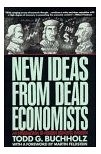Speed Reading
Fortune Magazine has published a list of 75 books of something called “The Smartest Books We Know” which is supposedly “a perfect reading list” on all sorts of subjects.
Being casually interested in Economics I was more than curious to see what their list included.
Especially since Fortune claimed, “This isn't some dusty business-book Hall of Fame.” Well, ok if that is the case why are books like
John Maynard Keynes “General Theory of Employment, Interest and Money” and Adam Smith’s “The Wealth of Nations” on that list?
Now before you start getting on me for “dissing” Adam Smith relax. I like Adam and I find his book interesting (if somewhat difficult to read). But I don’t pretend (and neither should Fortune Magazine) that reading Adam Smith will give you some great insight into today’s economics. Neither will it make you a great businessman.
In fact Smith’s book is exactly the type of book that should be placed in the “business book Hall of Fame”.
If you have studied or are studying economics, as a career chances are you already know all about Adam Smith and his theories. If you are not and are interested in furthering your knowledge of economics in order to better help you in today’s business world there are much better books for you to read.
For example:
ECONOMIC LITERACY: WHAT EVERYONE NEEDS TO KNOW ABOUT MONEY AND MARKETS. By Jacob DeRooy is an excellent book for people who want to have a good introduction to economics but don’t want to read some dry economic text.
But if you really want to know about Adam Smith and why he is so important to modern business then let me summarize it for you:
Adam Smith was one of the first people to write about business and finance and their interaction with the world at large.
He coined the term “invisible hand” to explain how markets act to people’s benefit in ways that aren’t obvious to us on the surface. His famous line in the book states that business people don’t produce the things we need because they are altruistic but because they want to make money (that’s my paraphrasing).
You don’t have to read very far into the book to get that information. But if you insist on reading the whole thing you will be swept up in the problems of ‘mercantilism” which in those days was the tendency of business and governments to believe that export surpluses were the only way to keep a nation's economy healthy. Those export surpluses were then to be used to purchase bullion. At the same time heavy tariffs were imposed on imports. This was an early form of anti-globalization.
Smith was against this and believed that trade should be fair and open. So in a way he was arguing for globalization almost 300 years ago.
As for John Maynard Keynes let me first start by quoting a review of his book posted on Amazon.com
A typical sentence/paragraph from the book:
'The fact that two incommensurable collections of miscellaneous objects cannot in themselves provide the material for a quantitative analysis need not, of course, prevent us from making approximate statistical comparisons, depending on some broad element of judgment rather than strict calculation, which may posses significance and validity within certain limits.
Sure.
This is the first book in years I gave up reading in the middle.
Until someone rewrites the book for humans - avoid!"
Exactly.
Even if you haven’t heard of Keynes your life has been affected by his theories. He was one of the first economists to suggest that governments could actively affect economies in more efficient ways than the private sector.
It is because of him that governments do crazy things like deficit spending in order to stimulate economic growth during recessions. Also when the government raises or lowers interest rates in order to control or stimulate growth. That is our friend Keynes in action.
Keynes theories though are controversial in some circles and have been discredited to some degree. In fact most people point to the “stagflation” period of the 70’s as a repudiation of Keynesian thought. You see Keynes didn’t think stagflation was possible.
That’s pretty much all you need to know about these two books. As Peter from Family Guy would say, “There, I saved you 10 long boobless hours”.
Besides the basic economics introduction I mentioned earlier I find it somewhat disturbing that a business magazine like Fortune wouldn’t include works by Milton Friedman who has won the Nobel Prize for Economics. Friedman is a noted critic of Keynes.
Also Ludwig von Mises /a contemporary of Keynes and one of the founders of the “Austrian School” of economics should be included here. Von Mises a fierce critic of socialism and government intervention in general is one of the staunchest defenders of laissez-faire capitalism you will find. And as a bonus there are plenty of easy books out there for those who want to learn about the “Austrian school” without having to immerse yourself in the core works which might be beyond the average person like:
Economics for Real People: An Introduction to the Austrian School by Gene Callahan
Or
Economics in one Lesson by Henry Hazlitt
I would have also added a category to Fortune’s list: Philosophy in which the works of Karl Popper, Ayn Rand and others would have been included.
One more thing, if you are looking for an easy to read book that covers the basic philosophies of all the major economists from Smith to Marx to Keynes you should pick up: New Ideas from Dead Economists: An Introduction to Modern Economic Thought by Todd G. Buchholz. It is a real fun read and you will learn a lot.
But then again some of you might prefer a good mystery novel.





No comments:
Post a Comment